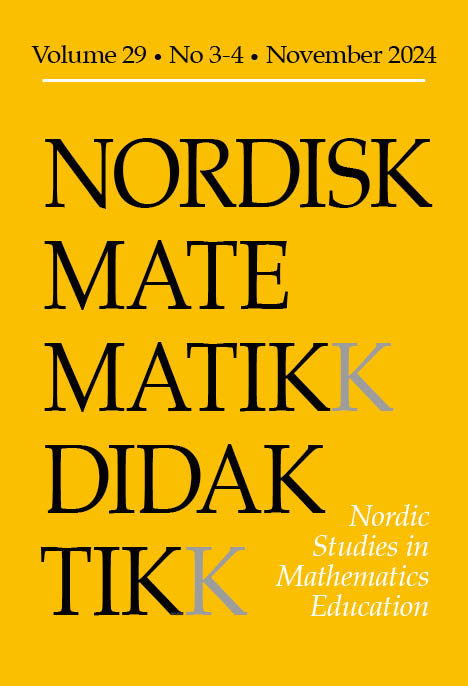Studying how a mathematics teacher’s professional identity shapes and is shaped by the use of digital resources in the classroom
DOI:
https://doi.org/10.7146/nomad.v29i3-4.150753Keywords:
mathematics educationAbstract
Teachers face many issues when trying to integrate digital resources (DR) into mathematics classes. This article applies an identity-based perspective to understand teachers’ roles in the practices that evolve in such classes. We focus on Victor, a Greek mathematics teacher, who, when viewed from levels beyond the classroom, experienced to become a reform-oriented teacher and a designer of DR. We explore how these experiences of professional identity shapes and is shaped by his work with DR at the classroom level. We show how Victor’s identity changed from ”being a mathematics teacher who struggles with inquiry-based teaching” to ”becoming a mathematics teacher who uses DR to support inquiry-based learning” and outline what fuelled these changes. Our results suggest that it is important to connect an identity perspective with classroom interactions and mathematics.
References
Chronaki, A. & Matos, A. (2014). Technology use and mathematics teaching: teacher change as discursive identity work. Learning, Media and Technology,
(1), 107–125. https://doi.org/10.1080/17439884.2013.776076
Charmaz, K. (2014). Constructing grounded theory. A practical guide through qualitative analysis (2nd ed.). Sage.
Clark-Wilson, A., Robutti, O. & Thomas, M. (2020). Teaching with digital technology. ZDM, 52 (7), 1223–1242. https://doi.org/10.1007/s11858-020-01196-0
Darragh, L. (2016). Identity research in mathematics education. Educational Studies in Mathematics, 93 (1), 19–33. https://doi.org/ 10.1007/s10649-016-9696-5
Elbaum-Cohen, A. & Tabach, M. (2020). A possible path from teachers’ collaboration towards teachers’ change in practice. In H. Borko & D. Potari (Eds.), Proceedings of the twenty fifth ICMI study on Teachers of mathematics learning and working in collaborative groups (pp. 118–125). University of Lisbon.
Flyvbjerg, B. (2006). Five misunderstandings about case-study research. Qualitative Inquiry, 12 (2), 219–245. https://doi.org/10.1177/1077800405284363
Goos, M. (2013). Sociocultural perspectives in research on and with mathematics teachers: a zone theory approach. ZDM, 45(4), 521–533. https://doi.org/10.1007/s11858-012-0477-z
Graven, M. & Heyd-Metzuyanim, E. (2019). Mathematics identity research: the state of the art and future directions. ZDM, 51(3), 361–377. https://doi.org/10.1007/s11858-019-01050-y
Hodgen, J. & Askew, M. (2007). Emotion, identity and teacher learning: becoming a primary mathematics teacher. Oxford Review of Education, 33 (4), 469–487. https://doi.org/10.1080/03054980701451090
Holland, D., Lachicotte Jr., W., Skinner, D. & Cain, C. (1998). Identity and agency in cultural worlds. Harvard University Press.
Kynigos, C. (2020). Half-baked constructionism: the challenge of infusing constructionism in education in Greece. In N. Holbert, M. Berland & Y. Kafai (Eds.), Designing constructionist futures: the art, theory, and practice of learning designs (pp. 61–72). MIT Press.
Lerman, S. (2000). The social turn in mathematics education research. In J. Boaler (Ed.), Multiple perspectives on mathematics teaching and learning (pp. 19–44). Ablex Publishing.
Lutovac, S. & Kaasila, R. (2018). Future directions in research on mathematics-related teacher identity. International Journal of Science and Mathematics Education, 16 (4), 759–776. https://doi.org/10.1007/s10763-017-9796-4
Potari, D., Psycharis, G., Sakonidis, C. & Zachariades, T. (2019). Collaborative design of a reform-oriented mathematics curriculum: contradictions and boundaries across teaching, research, and policy. Educational Studies in Mathematics, 102(3), 417–434. https://doi.org/10.1007/s10649-018-9834-3
Psycharis, G. & Skott, C. K. (2023). Studying a mathematics teacher’s documentational and identity trajectories over time. Journal of Mathematics Teacher Education. Published online. https://doi.org/10.1007/s10857-023-09605-3
Skott, C. K. & Skott, J. (2023). A novice teacher’s identities – from losing her balance to regaining her confidence. In M. Ayalon, B. Koichu, R. Leikin, L. Rubel & M. Tabach (Eds.), Proceedings of PME 46 (Vol.4, pp. 219–226). PME.
Skott, C. K., Psycharis, G. & Skott, J. (2021). Aligning teaching with current experiences of being, becoming and belonging: an identity perspective on the use of digital resources. In A. Clark-Wilson, A. Donevska-Todorova, E. Faggiano, J. Trgalová & H. Weigand (Eds.), Mathematics education in the digital age. Learning practice and theory (pp. 213-227). Routledge.
Skott, J. (2019). Changing experiences of being, becoming, and belonging: teachers’ professional identity revisited. ZDM, 51 (3), 469–480. https://doi.org/10.1007/s11858-018-1008-3
Skott, J. (2022). Conceptualizing individual-context relationships in teaching: developments in research on teachers’ knowledge, beliefs and identity. In J. Hodgen, E. Geraniou, G. Bolondi & F. Ferretti (Eds.), Proceedings of CERME 12 (pp. 34–60). Free University of Bozen-Bolzano.
Trouche, L., Gueudet, G. & Pepin, B. (Eds.). (2019). The ”resource” approach to mathematics education. Springer. https://doi.org/10.1007/978-3-030-20393-1
Wenger, E. (1998). Communities of practice: learning, meaning, and identity. Cambridge University Press. https://doi.org/10.2277/0521663636
Downloads
Published
How to Cite
Issue
Section
License

This work is licensed under a Creative Commons Attribution-NonCommercial-ShareAlike 4.0 International License.



